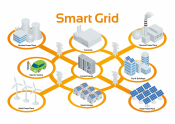
https://www.youtube.com/watch?v=yxABosWfuus
These changes are bringing problems to our existing energy sources as the businesses in the them have a lot invested in infrastructure and need to protect themselves from being left with a redundant asset, or, being in an industry that is side lined. A traditional coal powered electricity supply system involves, typically, a centrally located 1000 megawatt coal powered energy source and a grid network that distributes electric power over long distances to power the region. The major disadvantages of coal are that it produces massive amounts of pollution, including CO2, sulphur and other noxious gasses and also because of the size and heat of the boilers it is not a system that is easy to alter its output and often burns coal at night when power is not needed.
A modern grid system designed for the new energy sources would be divided into smaller districts and have smart switching to balance power with demand. The big difference between the old and the new systems is that the renewable energy comes from much smaller, constantly changing local sources but its big advantage is that the energy is free and that there are so many small outputs that the gains and losses balance one another out and make it a reliable system.
It’s a different kind of system but with modern monitoring and switching it is a cheaper system to provide power.
One way or another we will have to stop using fossil fuels and need an alternative that works.


 RSS Feed
RSS Feed